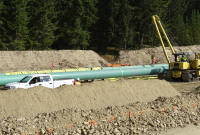Support strong Canadian climate journalism for 2025
The lack of a formal inquiry into foreign interference in Canadian politics would make critics of China in Canada feel more concerned about their personal safety, human rights groups say.
Critics say former governor general David Johnston's suggestion Tuesday that public hearings are adequate to address possible foreign interference in Canada is misguided, and holding a formal inquiry is one way to regain public trust in Canadian institutions.
Without it, many protesters and dissidents opposing the Beijing regime say they don't feel protected by the Canadian government against foreign harassment and intimidation when speaking out.
Mabel Tung, chairwoman of the Vancouver Society in Support of Democratic Movement, said Johnston's report found Ontario MP Han Dong had maintained "close relationships" with Chinese consular officials at least through the 2021 federal election, but still recommended against an inquiry.
"I don't understand why there's no wrongdoing, there's no consequence of those actions at all," Tung said in an interview.
"It gives us a feeling that we are not safe for speaking our minds as Canadians."
Mehmet Tohti, executive director of the Uyghur Rights Advocacy Project, said Johnston's recommendations for hearings rather than a formal inquiry was "shockingly" disappointing.
"In my opinion, the best way to detect or deter or counter Chinese interference in Canada is to have sunshine and transparency in the whole process," Tohti said. "Just expose all the dirty laundry in the public's eyes so the public can be better informed of what's happening."
Hearings, Tohti said, cannot do that because everything that can be discussed at hearings has already been made public.
He said the lack of an inquiry would make China's critics more worried about their personal safety in the face of "trans-national oppression."
"Chinese influence (has) grown globally," he said. "And in contrast, we don't have any measures adopted here in Canada to offer that kind of safety zone for those human rights defenders and activists who are critical against China's human-rights abusers."
Margaret McCuaig-Johnston, a China expert at the University of Ottawa, said the frustration and fear among diaspora groups critical of the Beijing regime is substantial because they feel their speaking up has "amounted to nothing."
She said in a statement that dissidents speaking out are taking on significant risk, and Johnston's recommendations of holding public hearings need to take the safety of those testifying into account.
In March, Prime Minister Justin Trudeau tasked Johnston to lead an investigation into the extended impact of foreign interference in Canada amid allegations that China meddled in the federal elections in 2019 and 2021.
Former Conservative member of Parliament Kenny Chiu, who has said he was the target of foreign interference in 2021 when he lost his seat in the Vancouver-area riding of Steveston-Richmond East, said a formal inquiry is needed because the allegations have created doubt in the public's minds about the extent of foreign interference in Canadian institutions.
Chiu said the Canadian government should be focused on enacting laws and mechanisms to "prevent foreign actors in even intimidating and influencing one vote," such as the proposed foreign agent registry that is currently under consultations.
"It's important that we keep pushing for that," Chiu said. "... I would rather see the government of the day take the bull by the horn and do something about it."
This report by The Canadian Press was first published May 24, 2023.




Comments